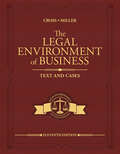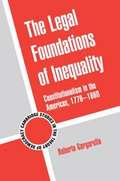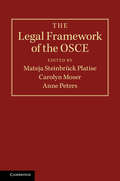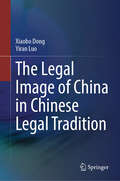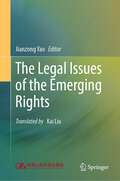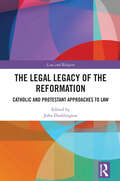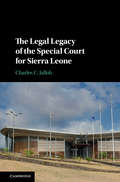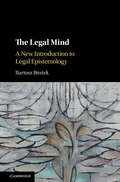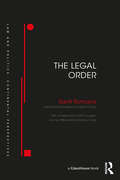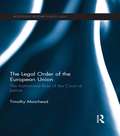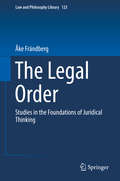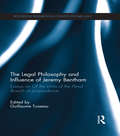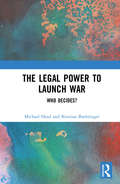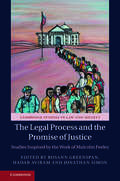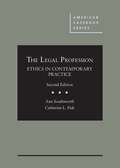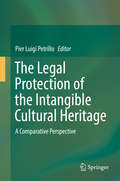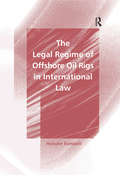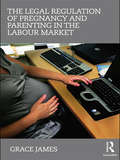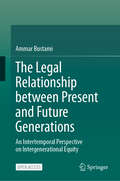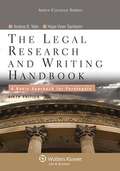- Table View
- List View
The Legal Environment of Business Text and Cases: Ethical, Regulatory, Global, and Corporate Issues
by Frank B. Cross Roger LeRoy MillerComprehensive, authoritative, and cutting-edge, THE LEGAL ENVIRONMENT OF BUSINESS combines a classic "black letter law" approach with an interesting and accessible reader-friendly format. The cases, content, and features of the exciting new Eighth Edition have been thoroughly updated to represent the latest developments in the business law environment. An excellent assortment of included cases ranges from precedent-setting landmarks to important recent decisions, and ethical, global, and corporate themes are integrated throughout. In addition, numerous features and exercises help you master key concepts and apply what you've learned to real-world issues, and the book offers an unmatched range of support resources--including innovative online review tools.
The Legal Environment of Business, A Managerial Approach: Theory to Practice
by Sean Melvin F. E. Guerra-PujolLegal Environment of Business, A Managerial Approach: Theory to Practice emphasizes bridging the gap between understanding legal doctrines that impact the business environment and how business owners and managers use legal insight to limit liability and manage risk. Its distinct approach focuses on using teaching features, simulations, case studies, examples, and case law that is accessible and engaging because it is specifically tailored for business students.
The Legal Environment of Business: Text and Cases
by Roger Miller Frank CrossComprehensive, authoritative, and cutting-edge, THE LEGAL ENVIRONMENT OF BUSINESS combines a classic black letter law approach with an interesting and accessible reader-friendly format. The cases, content, and features of the exciting new Tenth Edition have been thoroughly updated to represent the latest developments in the business law environment. An excellent assortment of cases ranges from precedent-setting landmarks to important recent decisions. Ethical, global, e-commerce, digital, and corporate themes are integrated throughout; for example, new Digital Update features affecting the law are included throughout this edition.
The Legal Environment of Business: Text and Cases (MindTap Course List)
by Frank B. Cross Roger LeRoy MillerCross/Miller's market-leading THE LEGAL ENVIRONMENT OF BUSINESS: TEXT AND CASES, 11E delivers comprehensive, cutting-edge coverage using an interesting, understandable approach. You master vital skills as you study the legal environment within the context of law in today's increasingly regulated business world. Dozens of examples, business-oriented features, and step-by-step analyses place every topic within a meaningful context. You learn how today's legal environment is more about the constraints of business than the simple rules of law with this book's focus on managerial decision-making and current events. This edition makes ethics a priority with a new framework -- the IDDR Approach -- for making ethical decisions. The authors focus less on black letter law and more on broader issues that correspond to what business owners and managers face. Updated cases, content, and learning features present the latest developments and skills to succeed in today's legal landscape.
The Legal Foundations of Inequality
by Roberto GargarellaThe long revolutionary movements that gave birth to constitutional democracies in the Americas were founded on egalitarian constitutional ideals. They claimed that all men were created equal with similar capacities and also that the community should become self-governing. Following the first constitutional debates that took place in the region, these promising egalitarian claims, which gave legitimacy to the revolutions, soon fell out of favor. Advocates of a conservative order challenged both ideals and favored constitutions that established religion and created an exclusionary political structure. Liberals proposed constitutions that protected individual autonomy and rights but established severe restrictions on the principle of majority rule. Radicals favored an openly majoritarian constitutional organization that, according to many, directly threatened the protection of individual rights. This book examines the influence of these opposite views during the 'founding period' of constitutionalism in countries including the United States, Argentina, Colombia, Chile, Ecuador, Mexico, Peru, and Venezuela.
The Legal Framework of the OSCE
by Anne Peters Mateja Steinbrück Platise Carolyn MoserThe Organization for Security and Cooperation in Europe (OSCE), the world's largest regional security organisation, possesses most of the attributes traditionally ascribed to an international organisation, but lacks a constitutive treaty and an established international legal personality. Moreover, OSCE decisions are considered mere political commitments and thus not legally binding. As such, it seems to correspond to the general zeitgeist, in which new, less formal actors and forms of international cooperation gain prominence, while traditional actors and instruments of international law are in stagnation. However, an increasing number of voices - including the OSCE participating states - have been advocating for more formal and autonomous OSCE institutional structures, for international legal personality, or even for the adoption of a constitutive treaty. The book analyses why and how these demands have emerged, critically analyses the reform proposals and provides new arguments for revisiting the OSCE legal framework.
The Legal Image of China in Chinese Legal Tradition
by Xiaobo Dong Yiran LuoThis book focuses on the study of China&’s legal image in the Chinese legal tradition, taking Chinese classics as the carrier of the study of China&’s legal image, and provides a pioneering approach to the study of China&’s legal image through a comprehensive and interdisciplinary analysis of the spreading of ancient Chinese classics outside the region. The rich legal thoughts and profound political wisdom contained in the Chinese legal tradition have deeply influenced and shaped the contemporary Chinese legal culture. China&’s legal image has undergone twists and turns in western world for the past few centuries. This book intends to unveil the underlying causes and effects thereof, explore the construction of legal images in the process of the spreading of Chinese classics from different dimensions, and offer the world a way to understand the formation of China&’s extraterritorial legal images and the cultural origin of contemporary Chinese rule of law thought. It provides a feasible path for general readers and students of relevant majors and professions whoever wants to know better Chinese legal culture and legal philosophy and further understand Chinese rule of law concepts and culture in the New Era.
The Legal Issues of the Emerging Rights
by Jianzong YaoThis book systematically discusses the contents of the administrative right to know, the right to information, the right to gene, euthanasia and other emerging rights. The purpose of this book is to attract legal scholars to pay attention to these right changes in the process of China's social transformation, analyze the basic laws of right changes under the specific background of China's society and provide a theoretical system model for the establishment of China's legislative right recognition and right relief system. The typical feature of contemporary China is all-round social transformation. In such a transitional period, the construction of democracy, legal system and political system in China is gradually unfolding and developing with its unique mode. In the construction of legal system and the practical operation of legal system, the concept of rights, the thinking of rights and the logic of rights have in fact been running through the social and legal practice in China fordecades since the reform and opening up and have always become its background, keynote and background. Its typical realistic symptom is that a large number of rights belong to "new" for "China" the germination and birth of the type. In this context, this book tries to combine the general theory with the specific reality of the right landscape and preliminarily explores and explains the generation mechanism, existence basis, development logic and basic connotation of the "new" types of rights, that is, the main "emerging" or "new" types of rights in the transitional Chinese society. The purpose of this book is to draw the attention of the colleagues in the field of law to the reality of the emergence and development of "emerging" rights in our society. At the same time, taking this as an example, I hope that the colleagues in the field of law can deepen the study of rights, especially from the general and macro-study of rights to the more specific and micro-study of rights.
The Legal Legacy of the Reformation: Catholic and Protestant Approaches to Law (Law and Religion)
by John DuddingtonThe growing interest in the relationship between religion and law is, in the case of Christianity, often viewed in monolithic terms. Moreover, the debate is often seen in terms of the relationship of Christianity to the state along with discussions about, for example, religious freedom. Christianity is often seen as responding to claims made on it by the state and by the growth of secularism.This book takes a different approach. First, it makes the claim that Christianity has something of value to say about various pressing issues which are of direct relevance to contemporary society. Amongst these are the place of human rights and that of individual claims of conscience. Second, it does not regard Christianity as a monolithic whole but takes as its starting point the sundering of Christendom at the Reformation, which, it claims, led in many cases to divergent patterns of thought between Catholics and Protestants about law and its place in society. However, as this book shows, in many cases, Catholic and Protestant thinking on areas such as natural law is not as divergent as it is often thought.Five hundred years after the Reformation, the work presents a reflection on the roots of Catholic and Protestant thinking on law and its place in society. It will be of interest to canon lawyers as well as academics and students of law and religion.
The Legal Legacy of the Special Court for Sierra Leone
by Charles C. JallohThis important book considers whether the Special Court for Sierra Leone (SCSL), which was established jointly through an unprecedented bilateral treaty between the United Nations (UN) and Sierra Leone in 2002, has made jurisprudential contributions to the development of the nascent and still unsettled field of international criminal law. A leading authority on the application of international criminal justice in Africa, Charles Jalloh argues that the SCSL, as an innovative hybrid international penal tribunal, made useful jurisprudential additions on key legal questions concerning greatest responsibility jurisdiction, the war crime of child recruitment, forced marriage as a crime against humanity, amnesty, immunity and the relationship between truth commissions and criminal courts. He demonstrates that some of the SCSL case law broke new ground, and in so doing, bequeathed a 'legal legacy' that remains vital to the ongoing global fight against impunity for atrocity crimes and to the continued development of modern international criminal law.
The Legal Mind in America: From Independence to the Civil War
by Perry MillerSelected writings and speeches from the period.
The Legal Mind: A New Introduction to Legal Epistemology
by Bartosz BrożekHow does a lawyer think? Does legal intuition exist? Do lawyers need imagination? Why is legal language so abstract? It is no longer possible to answer these questions by applying philosophical analysis alone. Recent advances in the cognitive sciences have reshaped our conceptions of the human mental faculties and the tools we use to solve problems. A new picture of the functioning of the legal mind is emerging. In The Legal Mind, Bartosz Brożek uses philosophical arguments and insight from the cognitive sciences to depict legal thinking as a close cooperation between three cognitive mechanisms - intuition, imagination, and language - and addresses the question of how to efficiently use these mental tools. This novel and provocative approach provides a fresh perspective on legal thinking and gives rise to important questions pertaining to the limits of legal interpretation and rationality in the law.
The Legal Order (Law and Politics)
by Santi RomanoFirst published in 1917 (Part 1) and 1918 (Part 2), with a second edition in 1946, this is the first English translation of Santi Romano’s classic work, L’ordinamento giuridico (The Legal Order). <P><P>The main focus of The Legal Order is the notion of institution, which Romano considers to be both the core and distinguishing feature of law. After criticising accounts of the nature of law centred on notions of rule, coercion or authority, he offers a compelling conception, not merely of law as an institution, but of the institution as ‘the first, original and essential manifestation of law’. Romano advances a definition of a legal institution as any group who share rules within a bounded context: for example, a family, a firm, a factory, a prison, an association, a church, an illegal organisation, a state, the community of states, and so on. Therefore, this understanding of legal institutionalism at the same time provides a ground-breaking theory of legal pluralism whereby ‘there are as many legal orders as institutions’. <P><P>The acme of a jurisprudential current long overlooked in the Anglophone environment (Romano’s work is highly regarded in France, Germany, Spain and South America, as well as in Italy), The Legal Order not only proposes what Carl Schmitt described as a ‘very significant theory’. More importantly, it offers precious insights for a thorough rethinking of the relationship between law and society in today’s world.
The Legal Order of the European Union: The Institutional Role of the Court of Justice (Routledge Research in EU Law)
by Timothy MoorheadThe objective of European integration serves as an ideal of the legal order of the European Union and invites reconsideration of law’s conceptual features. This book critically assesses the legal order of the European Union, focusing on the operative aspects of the Union constitution with particular reference to the institutional practices of the Court of Justice in expressing the values underlying this constitution. Drawing together positivist and non-positivist accounts within an institutional understanding of law, Timothy Moorhead breaks new ground in applying a range of analytic jurisprudential perspectives to the Union legal order, and in employing the theoretical resources provided by the Union to model a revised conceptual viewpoint concerning legal order generally. In offering this conceptual approach, Moorhead emphasises the flexibility inherent in law’s institutional character as the basis for a theoretical rationalisation of the Union legal order. This book will be of great use and interest to scholars and students of European Union Law, Jurisprudence and European Constitutionalism.
The Legal Order: Studies in the Foundations of Juridical Thinking (Law and Philosophy Library #123)
by Åke FrändbergIn this monograph a fundamental distinction is made between law and juridical thinking. Law is the content of legal rules and the systems of legal rules. Juridical thinking is the handling of the law by the lawyers. To this distinction corresponds a basic distinction between the language of law and the language of juridical thinking, and correlatively, between L-concepts (law concepts) and J-concepts (juridical or jurisprudential concepts). The monograph is devoted to the J-concepts, especially of technical (not ideological or evaluative) J-concepts. Four kinds of J-concepts are investigated: morphological J-concepts, those that help us to structure the law in a logical and functional way; topological J-concepts, those that help us to indicate the phenomena to which the law is applicable, and to separate the areas of application for different legal systems; praxeological J-concepts, those that help us to explore the relations between law and action, and methodological J-concepts, those that help us to describe the methods of the professional-juridical handling of the law. The work can be characterised as presenting a lawyer´s philosophy of law.
The Legal Philosophy and Influence of Jeremy Bentham: Essays on 'Of the Limits of the Penal Branch of Jurisprudence' (Routledge Research in Constitutional Law)
by Guillaume TusseauGathering together an impressive array of legal scholars from around the world, this book features essays on Jeremy Bentham’s major legal theoretical treatise, Of the Limits of the Penal Branch of Jurisprudence, reassessing Bentham’s theories of law as well as his impact on jurisprudence. While offering a suggestive picture of contemporary Bentham studies, the book provides a thorough examination of concepts such as legal discourse, legal norms, legal system, and subjective legal positions. The book compares Bentham’s approach with other landmark theories and the works of major legal philosophers including Austin, Hart and Kelsen, and explores Bentham’s treatise through major trends in contemporary legal thought, such as the imperative theory of law, deontic logic, Scandinavian and American legal realisms, the pure theory of law, and critical legal thought. Resisting any apologetic stance, the book elucidates how consistent with Bentham’s all-encompassing project of utilitarian reform ‘Limits’ turns out to be, and how this sheds light on contemporary modes of governance. The book will be great use and interest to scholars and students of contemporary jurisprudence, legal theory, 19th century philosophy, and public law.
The Legal Power to Launch War: Who Decides?
by Michael Head Kristian BoehringerThe issue of who has the power to declare war or authorise military action in a democracy has become a major legal and political issue, internationally, and is set to become even more pertinent in the immediate future, particularly in the wake of military action in Syria, ongoing wars in the Middle East, and tense discussions between the United States and its allies, and Russia and China. This book comparatively examines the executive and prerogative powers to declare war or launch military action, focusing primarily on the United States, Britain and Australia. It explores key legal and constitutional questions, including: who currently has the power/authority to declare war? who currently has the power to launch military action without formally declaring war? how, if at all, can those powers be controlled, legally or politically? what are the domestic legal consequences of going to war? In addition to probing the extensive domestic legal consequences of going to war, the book also reviews various proposals that have been advanced for interrogating the power to commence armed conflict, and explores the reasons why these propositions have failed to win support within the political establishment.
The Legal Process and the Promise of Justice: Studies Inspired by the Work of Malcolm Feeley (Cambridge Studies in Law and Society)
by Jonathan Simon Rosann Greenspan Hadar AviramMalcolm Feeley, one of the founding giants of the law and society field, is also one of its most exciting, diverse, and contemporary scholars. His works have examined criminal courts, prison reform, the legal profession, legal professionalism, and a variety of other important topics of enduring theoretical interest with a keen eye for the practical implications. In this volume, The Legal Process and the Promise of Justice, an eminent group of contemporary law and society scholars offer fresh and original analyzes of his work. They asses the legacy of Feeley's theoretical innovations, put his findings to the test of time, and provide provocative historical and international perspectives for his insights. This collection of original essays not only draws attention to Professor Feeley's seminal writings but also to the theories and ideas of others who, inspired by Feeley, have explored how courts and the legal process really work to provide a promise of justice.
The Legal Profession: Ethics in Contemporary Practice (American Casebook Series)
by Ann Southworth; Catherine L. FiskWith clear and concise explanations of all basic concepts in the law of lawyering and all topics tested on the MPRE, this accessible book allows professors to satisfy the ABA professional responsibility requirement with a course that students find highly engaging and useful.
The Legal Protection of the Intangible Cultural Heritage: A Comparative Perspective
by Pier Luigi PetrilloThis book describes the global legal framework for safeguarding the “Intangible Cultural Heritage” – as defined by the UNESCO Convention in 2003 – and analyses its use in selected countries in the Americas, Asia, Africa and Europe. Each of the contributions has been prepared by high profile experts and strategically addresses countries that are representative for their corresponding area. Our understanding of the term “Cultural Heritage” has changed considerably over the past few decades, and it is becoming increasingly clear that the concept also includes traditions and living expressions that we inherit from our ancestors and pass on to our descendants. UNESCO has recognised and responded to this change of perspective, creating through the 2003 Convention an international instrument for safeguarding the “Intangible Cultural Heritage”, a notion including oral traditions, performing arts, social practices, rituals, festive events, knowledge and practices concerning nature and the universe, as well as the knowledge and skills needed to produce traditional crafts. New values, practices and heritages were recognized – from the ancient African rituals to the Mexican Mariachi musical expression to the Brazilian Samba and the Mediterranean Diet – all of which convey strong social and cultural meaning for their community's identity. Intangible Cultural Heritage is a growing, relatively recent field of study and also an emblem of the dialogue between distant populations with different cultures, which is the reason why a comparative approach is the most appropriate basis for conducting an analysis of how the contracting states to the Convention live up to their commitments through national safeguarding measures and enhancement policies or through international cooperation projects.
The Legal Regime of Offshore Oil Rigs in International Law
by Hossein EsmaeiliThis book reviews and examines the relevant portions of all international treaties, cases and the national law and practice of states, in relation to international aspects of offshore oil rigs. By doing so, it offers an understanding of the legal regime surrounding oil rigs and formulates an international law framework. It investigates the issues under consideration by analyzing provisions of international law pertaining to all aspects of oil rigs, as well as international treaties and their travaux preparatoires. It also examines the national legislation of major offshore oil and gas producers and defines a framework of customary international entities such as the OSPAR and the petroleum industries of certain major offshore oil producers. Based upon the book's findings, it is clear that in spite of their increasing importance, offshore oil installations are subject to fragmentary and vague legal rules under international law.
The Legal Regime of Straits
by Hugo Caminos Vincent P. Cogliati-BantzThe right of transit passage in straits and the analogous right of archipelagic sealanes passage in archipelagic states, negotiated in the 1970s and embodied in the 1982 UNCLOS, sought to approximate the freedom of navigation and overflight while expressly recognising the sovereignty or jurisdiction of the coastal state over the waters concerned. However, the allocation of rights and duties of the coastal state and third states is open to interpretation. Recent developments in state practice, such as Australia's requirement of compulsory pilotage in the Torres Strait, the bridge across the Great Belt and the proposals for a bridge across the Strait of Messina, the enhanced environmental standards applicable in the Strait of Bonifacio and Canada's claims over the Arctic Route, make it necessary to reassess the whole common law of straits. The Legal Regime of Straits examines the complex relationship between the coastal state and the international community.
The Legal Regulation of Pregnancy and Parenting in the Labour Market
by Grace JamesWhy is the law failing to protect pregnant workers and parents from detrimental treatment in the workplace? This theoretically informed book, which draws on the findings of a large scale, Nuffield Foundation funded, study of pregnancy-related workplace disputes, explores the legal regulation of pregnancy and parenting in the labour market. Using an epistemology that draws primarily on critical feminist debates, theories and critiques, the book adopts a necessarily female standpoint and seeks to answer why, despite positive policy ambitions and ample legislation, law is failing to protect pregnant workers and parents. Whilst sensitive to the limits of law’s ability to bring about social change, the book asks whether it is the direction of current policies that need attention, or the substance of the legislation that is flawed. Is it the application of the law in courts and tribunals that fails working families or the mechanics of the employment dispute resolution and tribunal system that needs adjusting? This book will interest academics, students and practitioners of law and social policy interested in employment law and discrimination.
The Legal Relationship between Present and Future Generations: An Intertemporal Perspective on Intergenerational Equity
by Ammar BustamiThe legal relationship between present and future generations is shaped by the concept of intergenerational equity. This concept and its structures of implementation are still controversial today. The present book examines two connected research questions. First, it analyses the legal contents and structures of the concept of intergenerational equity as of today. In this regard, the book addresses two manifestations of intergenerational equity: a general conception and a specific doctrine of intergenerational equity that both differ in their contents as well as their legally binding character. Furthermore, the operationalisation of the concept is still in progress as far as the respective duty-bearers and potential right-holders as well as means of representation are concerned. In this context, the various attempts and actual forms of representation of future generations in policy-making and international and national judicial proceedings are analysed and categorised. The first part of the book comes to the conclusion that intergenerational equity from a contemporaneous perspective is continuously evolving between lex lata and lex ferenda.Therefore and second, the book examines which legal understanding the present generation would and should base its answer on from an intertemporal law perspective on the legal relationship between the present and the future. Starting from the existing doctrine of intertemporal law, this doctrine cannot be applied par for par to the concept of intergenerational equity due to formal as well as substantial reasons. The inherently intertemporal nature of intergenerational equity as well as the irreversible impacts of most intergenerational violations require a shift of perspective with regard to intergenerational equity. The book establishes a modified doctrine of intertemporal law that is adequately applicable to disputes on intergenerational equity. This is an open access book.
The Legal Research and Writing Handbook: A Basic Approach for Paralegals (6th Edition)
by Andrea B. Yelin Hope Viner SambornThe highly successful textbook on research and writing makes every step of the process accessible to paralegal students. The authors provide effective research tools, practical strategies and an efficient procedure for researching the law with both traditional and electronic sources. Step-by-step instruction leads students through each stage of activity, from prewriting to revising, and covers the IRAC method, legal memoranda, letters, and more. Invaluable pedagogy features examples, exhibits, expert writing tips,exercises, practice tips, ethics alerts, and web resources. Detailed subheadings provide quick access to topics, and appendices on helpful topics such as Shepardizing and Cite Checking, Citation and Sample Memoranda round out the presentation. The Student Workbook provides for extensive practice,sharpening research and writing skills. Thoroughly revised, the Sixth Edition presents new sample pages and updated exercises. Citation coverage has been updated to the 4th edition of ALWD and the 19th edition of The Bluebook . Inclusion of all the latest changes in legal research led to the revision of references, links, and examples. Students are now given more coaching on the practical aspects of outlining. The Instructor's Manual has expanded explanations, and answers to exercises and questions have been made clearer and more accessible. Hallmark features of The Legal Research and Writing Handbook:Accessible coverage of every step of the research and writing process Research tools and strategies teach an efficient process cover traditional and electronic sources Step-by-step instruction in legal writing process prewriting strategies to revising the IRAC method legal memoranda, letters, and more Excellent pedagogy examples and exhibits expert writing tips exercises practice tips ethics alerts web resources Detailed subheadings for quick access to topics Helpful appendices Shepardizing and Cite Checking Citation Sample Memoranda Student Workbook-extensive practice in research and writing skills ; Thoroughly updated, the revised Sixth Edition presents:New sample pages Citation coverage updated to 4th edition of ALWD and 19th edition of The Bluebook Latest changes in legal research Revised and updated material throughout:references links examples exercises More detail on practical aspects of outlining Thorough revision of the Instructor's Manual expanded explanations cogent and accessible answers to exercises and questions*Instructor's Manuals are a professional courtesy offered to professors only. For more information or to request a copy, please contact Wolter's Kluwer Law & Business at 800.529.7545 or examcopy@wolterskluwer.com.



